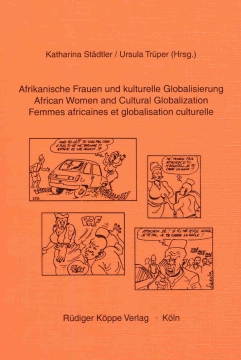


Studies concerned with the contribution of African women to the modern world are few. Even more scarce are depictions of African women as producers of modern art and culture. This collection of essays exemplifies that the women of Africa and the African diaspora have been successful in appropriating their material and intellectual environment and in adapting it to their own uses for the last two centuries. Not only did they face the most difficult living conditions, but answered productively to diverse forms of cultural globalization, which commonly entered their native societies as economic challenges from the outside. A substantial list of suggestions for further reading is included.
CONTENTS
Katharina Städtler / Ursula Trüper: Vorwort – Foreword – Préface
Dorothea Schulz: Instead of an introduction: Women and the global cultural industry – A critical assessment
Ursula Trüper: “Every sentence I translate, she is obliged to set it over ...“ – Zara Schmelen and the Nama language
Gesine Krüger: “I do desire to see my own land again ...” – Weiblichkeit und Schriftlichkeit in Südafrika
Katharina Städtler: La Négritude des femmes (1930–45)
Susan Arndt: „Wer hat Angst vorm Feminismus?“ – Feminismus in Afrika und afrikanischer Feminismus
Jean-Godefroy Bidima: “Womanism” et autoréflexion – Mise en discours et critique de l’Éxpérience-vécue des “féministes africaines”
Ingrid Laurien: Empowerment through storytelling? Oral literature and New Women’s Movement in Kenya
Susanne Gehrmann: Empowerment and crisis – Re-reading women characters in Aminata Sow Fall’s novels
Inmaculada Diaz Narbona: La mondalisation culturelle, quelle mondalisation? A propos de “Tu t’appelleras Tanga” de Calixthe Beyala
Henriette Mbollé: Produire le cinéma des femmes – Effets politiques, culturels et sociaux de la mondialisation économique
Elisabeth Linnebuhr: Ein Leso-Tuch ist Gold, es hilft in Schwierigkeiten – Frauenmacht und Kangakultur
Lucie-Blanche Miamouini-Nkouka: Céramique, potières congolaises et globalisation
Following these links you will find further publications on (cultural) globalization and women producing culture:
In diesem Band wird anhand ausgewählter Beispiele gezeigt, dass die Frauen Afrikas und der afrikanischen Diaspora es in den letzten beiden Jahrhunderten verstanden haben, sich aktiv ihre materielle und intellektuelle Umwelt anzueignen. So kamen sie nicht nur mit schwierigsten Lebensbedingungen zurecht, sondern antworteten produktiv auch auf verschiedene Formen der kulturellen Globalisierung, welche zumeist als ökonomischer Zwang von außen an ihre Herkunftsgesellschaft herangetragen wurde.
Ulrich van der Heyden in Internationales Afrikaforum, 2/2003, 197-198
Lisa Ott und Heike Wildemann in Anthropos, 97/2002, 300-301
© 2026 by Rüdiger Köppe Verlag – www.koeppe.de